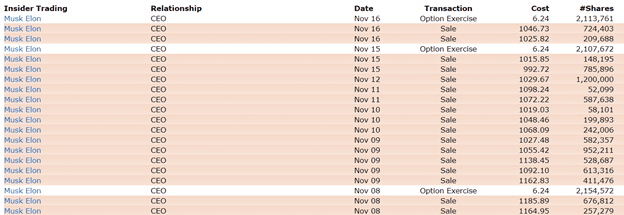Elon Musk asks Twitter if he should sell 10% of Tesla. He sold over $7.5 billion worth of stock in a little over a week. AMC CEO Adam Aron filed to sell $53 million, approximately 1.25 million shares, in stock the same week. TSLA and AMC are two of the darlings of the Meme-stock trading crowd, up 76% and 186% for the second half of the year, respectively. Do these insider stock transactions have any implications for investors of these companies?
Insider trading – where an individual utilizes non-public corporate information to make trades in a stock to profit from price movements when the market reacts to the eventual publication of the news – has a well-deserved negative connotation as an act of greed and a violation of trust. However, legal insider transactions occur all the time, as executives and board members of public companies purchase and sell their company’s stock, subject to SEC regulations. Most receive shares as performance compensation that “vest” (become available to be sold) over a set period of time. This vesting structure acts as employee retention as one will lose those shares not vested if they decide to leave the company. Why should investors pay attention to these insider transactions?
As the executives, managers and boards have the best knowledge of the operations, financials, performance, direction and outlook of publicly traded companies, investors should be aware of their stock purchases and sales as potential barometers of the firm’s fiscal health. All transactions must be filed with the SEC no later than two days after the transaction and are immediately made public. This makes this information timelier than most corporate actions.
As most public companies have a large number of employees, there can be multiple buyers and sellers of the company shares at the same time, especially as there are multitude reasons for insiders to trade their company shares. Therefore, investors should look at the net purchases or sales to discern continued operational success or failure, or a possible change in direction of the company’s fiscal situation.
There are a variety of reasons for insiders to sell company shares: the purchase of a home, tuitions, travel, debt payments, investments in a business, divorce settlement, monetization and diversification of assets, tax avoidance, and, of course, extended valuations. Because of the numerous reasons, it is sometimes difficult for investors to interpret these sales into a universal strategy. However, the magnitude, frequency and executive level of these sales can raise for potential buyers or existing shareholders yellow flags whether the stock’s price is overvalued.
On the flip side, there are basically only two reasons for insiders to purchase their company’s shares. When a person joins the board of directors or a high-level C-suite position they publicly show confidence in the company by purchasing shares, which is more symbolic than strategic. The other reason is if they believe the stock is undervalued and going higher. Due to the fewer possible rationales, investors tend to predominantly utilize insider buying more than selling – as supplemental information and an indicator of expected fiscal outperformance – when making specific stock investment decisions.
However, when high-level insiders at Meme-type stocks, such as the aforementioned TSLA and AMC, make large sales, investors should assume these are opportunistic reductions of exposure at extended stock price levels. As discussed in our earlier piece on Meme stocks there are a number of loose criteria of a Meme-type stock:
This lack of historical earnings growth or fundamentals combined with the tremendous rise in stock prices highlight the benefit of insider selling data. It provides concrete information as to senior management’s appraisal of their stock’s valuation. As the recent filings below indicate, both CEO’s Musk and Aron view the current prices of TSLA and AMC as attractive selling points.


When the top management “cheerleaders” sell stock, especially a significant amount and when they have not sold shares previously, investors need to take notice.
In Summary
Insider transactions may provide useful and timely information for investors looking to purchase or sell individual stocks. While insider buying is often a bullish indicator, insider selling can be made for a variety of reasons, which can temper its effectiveness as a bearish indicator. However, in the case of high-flying speculative stocks resembling the Meme group, large sales by the top management shareholders are a caution flag of extended valuations for investors.